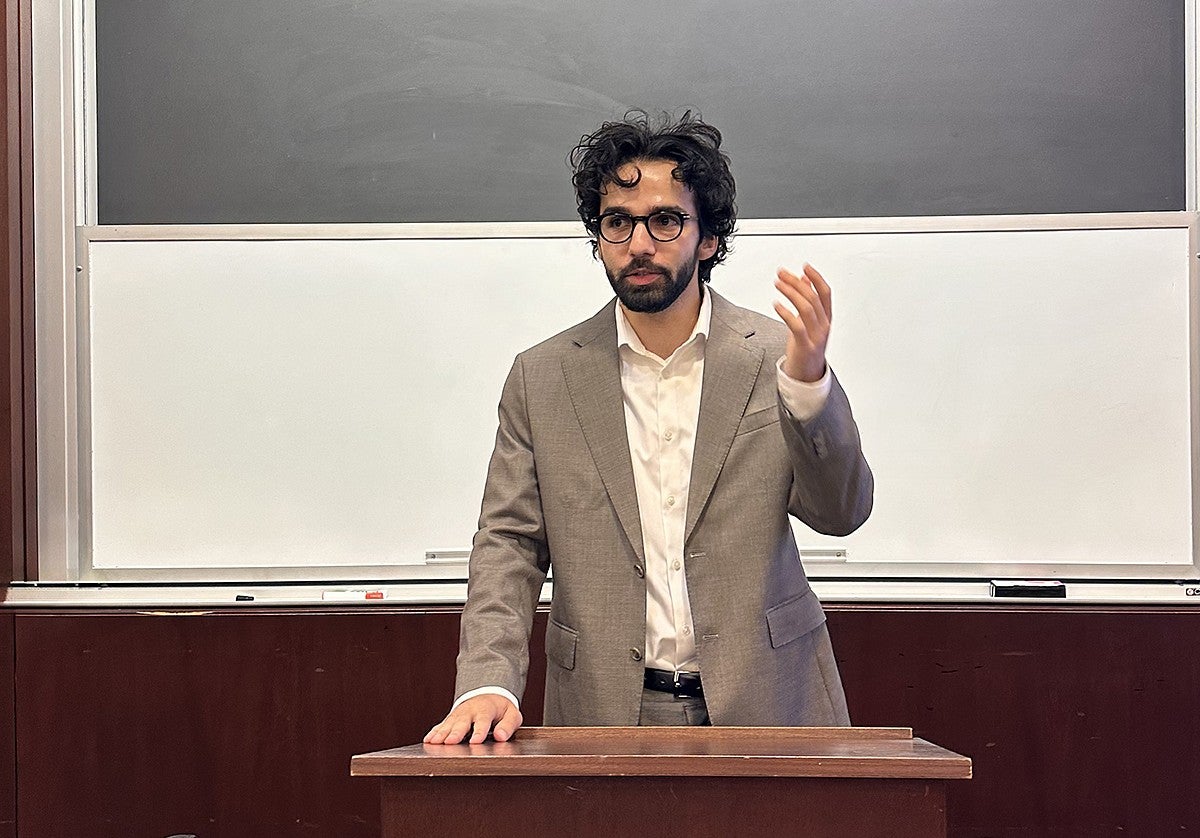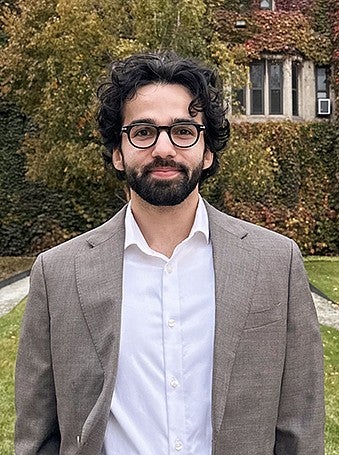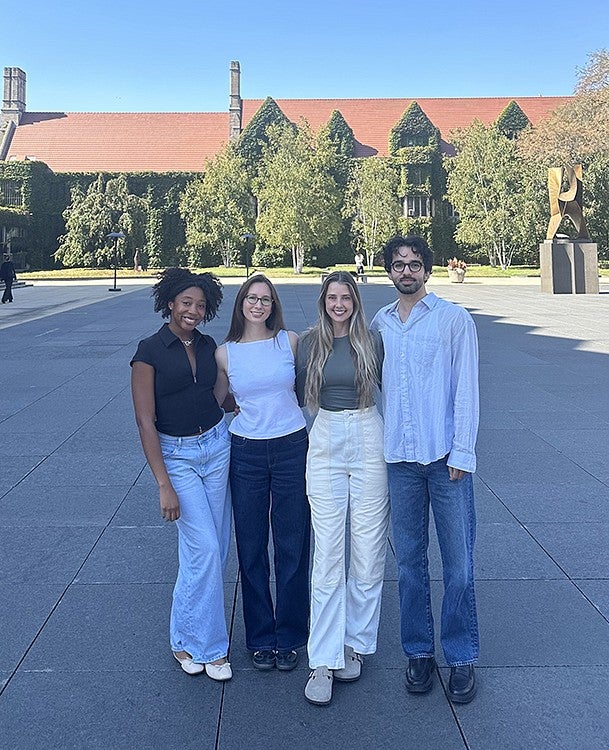
Language as a tool for justice

CHC Class of: 2022
Majors: Economics and Political Science
Favorite thing about the CHC: All the classes I had with Casey Shoop. He really inspired my liking for interdisciplinary academia.
Song on repeat: “Te Mata” by Kali Uchis
Favorite book: “The Bluest Eye” by Toni Morrison
Advice for CHC students: Take classes in the CHC that are outside of your career interests and focus on developing relationships with professors. The subjects you’re taught may not become a part of your life, but the relationships with professors are lifetime connections.
Parsa Aghel remembers the gatherings vividly. Late into the evening, whether in Portland or during his summer visits to Mashhad, Iran, everyone would coalesce in one room. Those who were good at storytelling — his mother among them — would take the lead for entertaining guests.
In elegant and poetic Farsi, his mother would command the attention of the room. As a kid, Aghel recalls wanting to reach that same ability with his English.
“I always remember wanting to emulate the use of language like that,” says Aghel, the former Stamps Scholar who graduated from the Clark Honors College in 2022 with degrees in economics and political science.
He’s now in his final year at the University of Chicago Law School, and he’s found his medium. For him, the study of law is just like storytelling — a way to use language as a tool for justice, just as his mother used it to captivate a room.
Language as inheritence
Growing up, Aghel spent nearly every summer in northeastern Iran, where he’d split his time between Mashhad and Nishapur — two cities in the Rasavi Khorasan province. Though small, Nishapur – located at the foot of the Binalud Mountain Range – is well-known for its arts and the poets and artists who come from there. It’s something his family has always been proud of.
“My parents always were known within the Iranian community as really good storytellers,” Aghel says now. “We always spoke Farsi, and I think the impact of wanting to have a robust character of storytelling and mastery of language was always very important to me.”
Before they were married, Aghel’s parents both immigrated from Iran. His father left during the Iranian Revolution and his mother made her way nearly 20 years later after living through the Iraq-Iran war. The couple moved to Oakland, California, and eventually settled in Portland where Aghel and his sister grew up.
Watching his parents navigate living in a new place while maintaining their cultural identity taught Aghel that language is power. Watching his mother go through the citizenship process, he saw how the right words in the right order could mean the difference between staying and leaving. “It’s a big reason why I’ve always taken an interest in immigrants’ and refugees’ rights,” he says.
Growing a conscience
By middle school and high school, Parsa was taking humanities and history classes that shaped his worldview. His teachers had a strong liberal focus on teaching the consequences of history throughout periods of oppression.
“I was fortunate to have an education that had that kind of worldview at a young age,” he says. “I think it really shaped my conscience that purposes can be directed at just helping people, and it can be as simple as that.”
He came to the University of Oregon undecided, thinking about law and medicine. Both felt like ways that he could help people, but he wasn’t exposed to many lawyers growing up. Both potential careers felt foreign to him. So he took political science and economics classes, and he also took the full chemistry and lab suite, just in case. “I knew that my career would only be meaningful if it was directed at helping people,” he says. “I just didn’t know which was a better fit.”
The summer before his sophomore year, Aghel interned at the Immigration and Refugee Community Organization in Oregon, working with both immigration clients and asylum seekers.
“It was through that work that I realized immigrants and refugees are sort of treated as one and the same in political conversation, but in the legal sphere, the outcomes and the caselaw they face could not be more different,” he says.
His CHC thesis was born out of that observation. Working with CHC core faculty members Anita Chari and Casey Shoop, Aghel developed a project at the intersection of legal and philosophical approaches to refugee law. He dove into the work of French philosopher and political activist Michel Foucault and German-American historian and philosopher Hannah Arendt, exploring concepts of statelessness and biopower.
“There has been a lot of great philosophical scholarship on refugees, statehood and borders,” he says. “Through tons of conversations with Anita, I realized there’s potentially a link to apply between statelessness to the historical structure of how refugee law and immigration law were separated for a very meaningful and discriminatory reason.”
His thesis explored that history by applying philosophical insights in order to think about borders more abstractly, along with potential test cases to advance the rights of refugees.
“That was probably one of the most meaningful things I’ve done in undergrad, but also in my life, just in terms of the scale and time of it,” he says.
Aghel credits his time at the CHC with deftly preparing him for law school. As a Stamps Scholar, he was drawn by the interdisciplinary approach and promise of close faculty relationships.
"It provided an opportunity to have a liberal arts background even if it wasn’t necessarily part of my major,” he says.
Taking interdisciplinary classes taught him that it wasn’t just about what you were writing about, but how. When choosing law schools, he gravitated toward the University of Chicago specifically because it reminded him of the CHC’s approach.
“They were very honest about how rigorous it is,” he says. “But they also have brilliant professors who are very invested in teaching and providing a good education to their students and a good support system. That always reminded me of how closely connected the students were to the faculty at the Honors College.”
“That was probably one of the most meaningful things I’ve done in undergrad, but also in my life, just in terms of the scale and time of it.”
Finding community in Chicago
On his first day of orientation at law school, Aghel met Senam Okpattah, who would become one of his closest friends. They were assigned to the same cohort of students who take all their first-year classes together. The pair quickly realized they had a connection through CHC Dean Carol Stabile, who had taught perviously at Okpattah’s undergraduate institution, the University of Maryland.
“I feel like I’ve learned so much from him,” Okpattah says. “He’s gifted, not only in the way that he thinks and analyzes problems, but the way he interacts with the content that we’re taught.”
Okpattah, who is also graduating from law school this year, compares Aghel to the character Mike Ross in the old television series “Suits.” On the show, the character is an unlicensed lawyer who has a photographic memory and a quick wit that helps his firm win legal cases.
For Okpattah, Aghel’s sheer intelligence is what stands out in the comparison.
“Interpersonally, he’s just a very kind, friendly, humble, hilarious person,” she says. “When people first meet him, he can come across as maybe a little bit shy or more reserved, but I think it’s more so coming from a place of really just trying to learn as much as he can about a person and be a very keen listener.”
Aghel and Okpattah bonded over their shared experience of having relatives overseas — her father is from Ghana — and how that shaped their value systems and approaches to law.
“I think that experience has deeply shaped how we hope to leverage our understanding of the law to impact those communities,” Okpattah says. “Especially in a climate such as now, where we’re seeing a lot happening with immigration and various communities being adversely impacted. We’ve shared many conversations about how he hopes to leverage our education to create more justice and positive impact.”
In law school, where it’s easy to feel like there’s a narrow definition of success, Okpattah says Aghel doesn’t get swept up in what everyone else is doing.
“If opportunities don’t make sense in terms of what he values and the kind of impact he wants to cultivate through his work, he’s going to be very intentional and thoughtful about what he chooses to do,” she says. “He’s not swayed by those things. And I really admire that about him.”

Aghel has found his people at law school. He and Okpattah are part of a friend group of four who celebrate each other’s birthdays with dinners that can last hours, filled with inside jokes, running bits and conversations about everything from law school to pop culture to politics.
“We have a way of taking situations that can feel burdensome and heavy and daunting and stressful — because law school is not easy — and making it lighthearted and fun,” Okpattah says. “I think we do a really good job in those moments of keeping each other grounded.”
Putting language to work
In his final year at law school, Aghel has found ways to put his education into practice. He works for the school’s Civil Rights and Police Accountability Clinic, where he’s supported litigation against the city and the Chicago Police Department.
“Especially knowing Chicago’s very deep and traumatic history with police brutality, I was very drawn to serving the community,” he says. “Studying the carceral state was pretty integral to my education at UO. So, actually being able to work in a clinic where I’m on the real-life side of academia has been very meaningful.”
This past summer, he worked at two firms — one in San Francisco and one in New York City — before landing at Lieff Cabraser, a plaintiff-side firm in New York.
“What I really like about (Lieff Cabraser) is that it’s a firm composed of a lot of different practice groups, but all are aimed at civil rights litigation, consumer protection, antitrust, environmental work and more. Because I have a wide array of interests — climate change, immigrants’ rights, civil rights, economic justice — this firm is definitely setting me up to be able to expose myself to all the different things that I’m interested in and be able to serve the public through all of them.” His long-term goals include appellate litigation, which can set precedent and shape the law in meaningful ways. He’s also interested in international law and maybe, someday, journalism.
“I think a legal degree is not just cabining you within the courtroom,” he says, nodding to his role models Philip A. Randolph and Toni Morrison as examples of social justice activists who used language as a powerful tool.
Okpattah envisions a profound impact ahead for her friend, saying she can see Aghel everywhere — including maybe serving as a law professor at an esteemed institution.
“No matter what it is, I just envision him being a zealous advocate, whether it be through the literature he publishes or a case he argues in the courtroom,” Okpattah says.
For now, he’s focused on what comes next after graduation in June 2026. Having already landed a job at Lieff Cabreser, he’ll move to New York to start his official career. And he plans to bring with him the storytelling tradition his parents passed down, the critical thinking skills he developed at the CHC and the understanding that language has the power to change lives.
